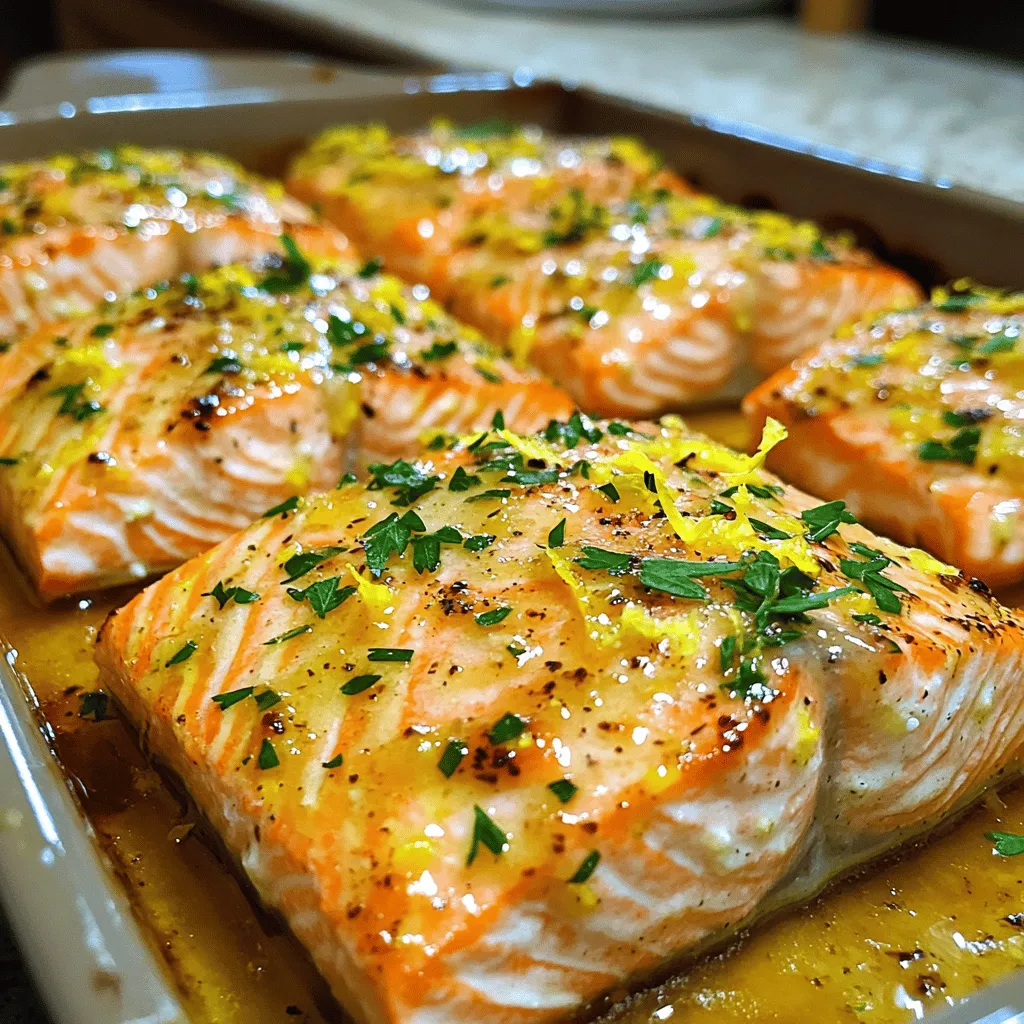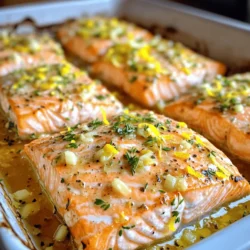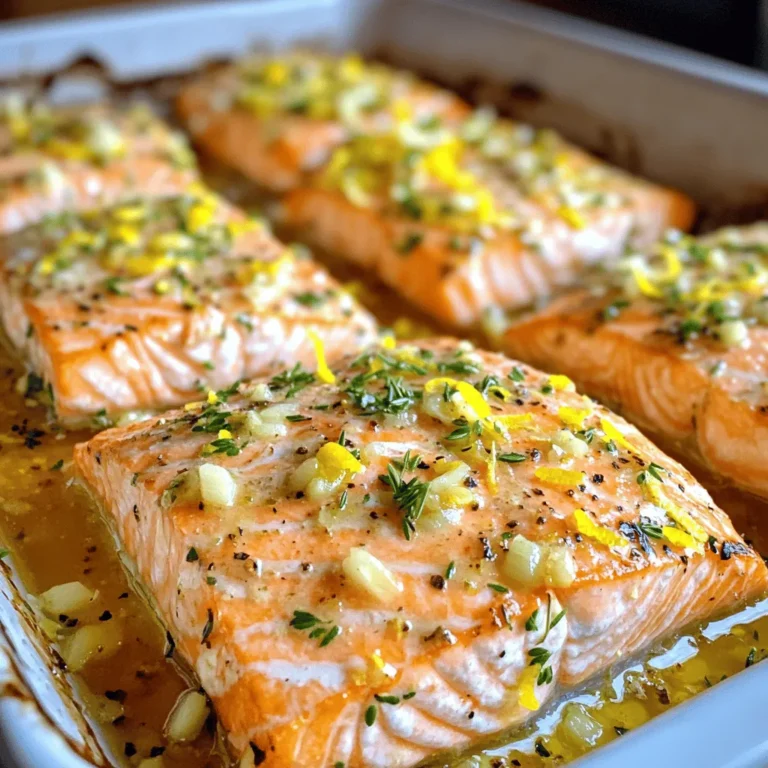Are you ready to elevate your dinner game with a dish that marries simplicity and bold flavor? My Lemon Garlic Roasted Salmon is not just easy to whip up, but it also bursts with fresh ingredients that will wow your taste buds. In this post, I’ll guide you through every step, from prepping the marinade to adding the perfect final touches. Let’s get cooking and transform your meal into something special!
Ingredients
List of Ingredients
– Salmon fillets
– Garlic
– Lemon
– Olive oil
– Fresh thyme
– Sea salt
– Black pepper
– Fresh parsley
Ingredient Substitutions
You can use different fish if you want. Try trout or halibut for variety. If you don’t have fresh thyme, try dried thyme or even rosemary. Other herbs like dill or basil can add a nice touch. Feel free to play with spices too. A pinch of paprika or cayenne can add some heat.
Importance of Fresh Ingredients
Fresh ingredients make all the difference. They enhance the flavor of your dish. Fresh salmon has a bright taste that frozen fish can lack. Fresh garlic gives a bold kick that bottled garlic can’t match. Using fresh herbs adds a lovely aroma and taste. Plus, fresh produce holds more nutrients. You benefit from better health with fresh food choices.
Step-by-Step Instructions
Preparation Steps
– Preheating the oven: Start by preheating your oven to 400°F (200°C). This step gets your oven ready for cooking the salmon evenly.
– Mixing the marinade: In a bowl, mix together the minced garlic, lemon zest, lemon juice, olive oil, thyme, sea salt, and black pepper. This marinade offers a burst of flavor that makes the salmon shine.
Cooking Instructions
– Marinating the salmon: Take the salmon fillets and place them skin-side down in a baking dish. Pour the garlic-lemon marinade over each fillet. Let it sit for at least 15 minutes. This time helps the salmon absorb all the tasty flavors.
– Roasting time and techniques: Put the baking dish in the oven. Roast the salmon for 12-15 minutes. The salmon is done when it flakes easily with a fork. Keep an eye on the time, as thicker fillets may need a bit more cooking.
Final Touches
– Broiling for added flavor: For extra crispiness, switch your oven to broil. Broil the salmon for 2-3 minutes. This will add a nice texture to the top of the fillets.
– Letting the salmon rest: Remove the salmon from the oven and let it rest for a few minutes. Resting helps the juices settle, keeping the fish moist. If you like, sprinkle some chopped parsley on top for a fresh touch.
Tips & Tricks
Cooking Techniques
How do you tell when salmon is done?
The best way to check salmon is to use a fork. Gently press the fillet. If it flakes easily, it is ready. Salmon should reach an internal temperature of 145°F (63°C). This ensures it is safe to eat but still moist.
How can you ensure even cooking?
Place salmon fillets skin-side down on a baking dish. Arrange them in a single layer. This helps heat circulate evenly. Try to use fillets of similar thickness to cook at the same rate.
Marinade Enhancements
What can you add to the marinade for a twist?
You can add spices like paprika or cayenne for heat. For a sweet touch, try honey or maple syrup. Fresh herbs like dill or basil can also brighten the flavor. Experimenting with different flavors keeps the dish exciting.
Presentation Tips
How can you serve salmon for a beautiful plate?
Serve your salmon over a bed of sautéed spinach or roasted asparagus. This adds color and nutrition. You can also pair it with a light salad for balance.
What are some garnishing techniques?
Sprinkle chopped fresh parsley over the salmon for a pop of color. Add lemon wedges on the side for extra zest. A drizzle of balsamic glaze can also elevate the look and taste.

Variations
Flavor Variations
You can spice up lemon garlic salmon in fun ways. Try adding red pepper flakes for a kick. This spicy lemon garlic salmon brings heat and flavor together. You can also change the herbs. Use fresh basil or dill instead of thyme. Each herb adds its own unique taste. Experiment with these options to find your favorite!
Cooking Method Variations
You can cook salmon in many ways. Grilling gives it a smoky taste. Marinate the salmon, then grill it on medium heat for about 6-8 minutes per side. If you prefer baking, follow the recipe for roasting. You can also pan-sear salmon. Heat a skillet, add oil, and cook each side for about 4-5 minutes. This method gives a nice crust.
Serving Style Variations
Serving lemon garlic salmon with different sides can change your meal. Pair it with steamed broccoli or quinoa for a healthy plate. You can also create a salmon salad. Flake the cooked salmon, mix it with greens, and add a lemon vinaigrette. This gives you a fresh and light meal option.
Storage Info
How to Store Leftovers
To keep your lemon garlic roasted salmon fresh, you should store it right. Place leftovers in an airtight container. Refrigerate them within two hours of cooking. This will help keep the fish safe and tasty. Salmon lasts about three days in the fridge. If you want to keep it longer, freezing is a good option.
For freezing, wrap each piece of salmon in cling film. Then, place the wrapped pieces in a freezer bag. Make sure to squeeze out as much air as you can. This method helps avoid freezer burn. Frozen salmon can last up to three months.
Reheating Recommendations
When it comes to reheating, you want to keep the salmon moist and flavorful. The best method is to use the oven. Preheat the oven to 350°F (175°C). Place the salmon on a baking sheet and cover it with foil. Heat it for about 10-15 minutes. This keeps it from drying out.
You can also reheat it in a skillet. Heat a little olive oil over medium heat. Add the salmon and cover it. This way, it warms up evenly. If you want to keep the crispy top, use a broiler for just a minute or so. This adds a nice touch without losing flavor.
Shelf Life
Roasted salmon can last for three days in the fridge when stored properly. If you freeze it, you can enjoy it for up to three months. Just remember to check for signs of freezer burn. If it looks dry or has ice crystals, toss it out. Eating salmon at its best is always worth it!
FAQs
How do I know when the salmon is cooked?
You can tell if salmon is cooked by looking for two signs. First, the salmon should change from a translucent pink to an opaque color. Second, it should flake easily when you gently poke it with a fork. If it flakes apart, it is ready to eat. Cooked salmon should have an internal temperature of 145°F (63°C). Using a food thermometer can help you check this.
Can I use frozen salmon?
Yes, you can use frozen salmon. Just make sure to thaw it properly. The best way to thaw salmon is to place it in the fridge overnight. If you’re in a hurry, you can run cold water over the sealed fish for about an hour. Avoid using warm water, as that can cook the fish unevenly. Once thawed, make sure to pat it dry before marinating.
What can I serve with lemon garlic roasted salmon?
Lemon garlic roasted salmon pairs well with many sides. Here are a few ideas:
– Steamed asparagus
– Roasted Brussels sprouts
– Quinoa salad
– Garlic mashed potatoes
– Mixed green salad with lemon vinaigrette
These sides add color and flavor to your meal.
Can I prepare the marinade ahead of time?
Yes, you can make the marinade ahead of time. Mix the garlic, lemon juice, and olive oil and store it in the fridge. It will stay fresh for up to 24 hours. This way, you save time when you are ready to cook. Just remember to stir the marinade again before using it on the salmon. This ensures you get all the flavors mixed well. For the best taste, try to marinate the salmon for at least 15 minutes before roasting.
In this blog post, we explored the key ingredients for a delicious lemon garlic roasted salmon. We discussed tasty substitutes and the importance of using fresh items for better flavor and nutrition. I shared step-by-step instructions for preparing and cooking, along with helpful tips to perfect your dish. Lastly, we looked at variations and storage tips to keep your salmon fresh.
With these insights, you can create a delightful meal that impresses and satisfies. Enjoy cooking!


